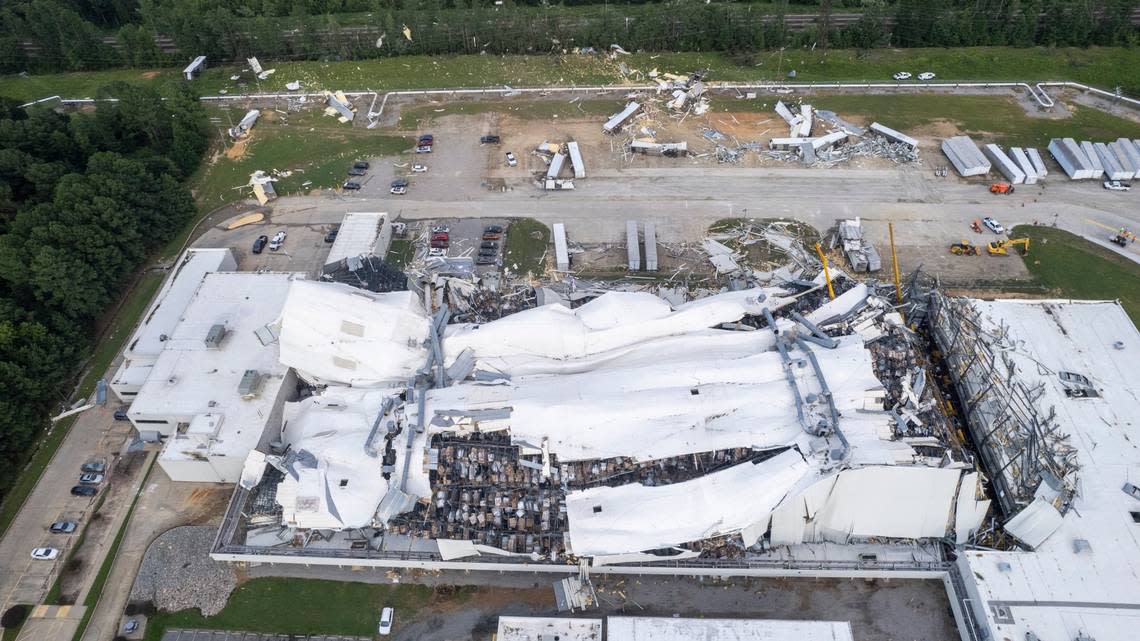Pfizer damage from Rocky Mount tornado expected to affect NC hospital supply chain

The tornado that swept through Rocky Mount on Wednesday could deepen existing drug shortages across the United States, as the damage included a massive Pfizer plant that produces nearly a quarter of the company’s sterile injectables used in U.S. hospitals.
At the 1.4 million-square-foot site, the pharmaceutical giant manufactures an array of health care products like neuromuscular blockers, anti-infectives and anesthesia.
Aerial photos from The News & Observer show significant damage to the facility.
The U.S. Food and Drug Administration, which tracks medical shortages nationwide, posted online that it is working with Pfizer “to understand the extent of the damage and any potential impact to the nation’s drug supply.”
Vizient, a Texas-based health care consulting firm, has been in communication with Pfizer to assess the wreckage.
“The significant level of damage that appears to have occurred at the facility is likely to be especially problematic for the supply chain because of the complexity of manufacturing processes and quality assurance testing requirements for sterile injectables,” Mittal Sutaria, a senior vice president at Vizient, told The N&O in an email.
Sutaria said the threat of supply chain strain was greater given Pfizer’s sizable market share and because many of the drugs produced at the Rocky Mount facility are known to already be in shortage.
WakeMed, UNC, and Duke respond
Triangle-area hospital systems on Thursday said they are bracing for disruptions.
“We do expect the potential for significant impact with products and supplies manufactured and stored at the Rocky Mount plant,” WakeMed spokesperson Kristin Kelly told The N&O in an email Thursday. “As Pfizer transitions production to other sites. WakeMed has been in touch with Pfizer as well as Premier, our group purchasing organization, to assess the situation as we manage our supply chain and resources. We have also developed a shortage plan for relevant products to maintain supply.”
UNC Health, which operates a hospital in Nash County, said it is relying on its “diverse supply chain network” to obtain necessary equipment.
“While the tornado damage to the Pfizer facility will likely have some impact across the system, not just Nash, we are working with our vendors to maintain a stable supply of injectables, pharmaceuticals and other supplies,” UNC Health spokesperson Phil Bridges said in an email.
Bridges said sterile injectables are used when patients are unable to orally take medications. For example, patients might be seriously ill or undergoing surgeries or procedures like colonoscopies or endoscopies.
Duke Health said it’s too soon to tell which, if any, of its supplies come from Pfizer’s Rocky Mount plant.
“Our teams are skilled at assessing supply chains and adjusting operations when needed,” the Durham-based health system said in an email.
Swelling U.S. drug shortages
From 2021 to 2022, shortages of anesthetics, certain antibiotics, and other key supplies increased by almost 30%, according to a U.S. Senate report, which found 295 drug shortages at the end of last year.
“These shortages have cascading effects on patient care, causing delays in treatment, increasing the risk of medication errors, and requiring the use of less effective alternative treatments,” the report stated. “Hospitals have also experienced increased costs, medication waste, and limited staffing capacity to address and remedy shortages.”
Pfizer is the largest employer in Nash County, having taken over the facility during its 2015 acquisition of the drugmaker Hospira. The site, about 50 miles northeast of Raleigh, covers 250 acres and employs more than 2,000 people.
The tornado was reported around 12:30 p.m. Wednesday. It registered as an EF3, according to the National Weather Service, meaning the tornado reached speeds of 150 mph.
Chrissy Anderson, a meteorologist with the weather service, said the agency received reports of 16 injuries but, as of now, no deaths.
In a statement Wednesday night, Pfizer officials said they “are assessing the situation to determine the impact on production.”
But in an email Thursday, a spokesperson said that process “is taking longer than anticipated. For example, only a small number of people have limited access to parts of the facility due to a variety of hazards still present, which makes the assessment and inspection difficult at this time.”
Teddy Rosenbluth contributed to this report.
